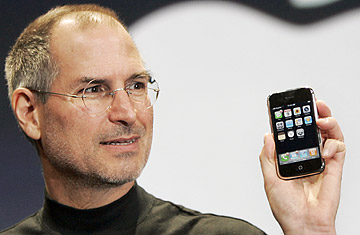
Apple CEO Steve Jobs demonstrates the new iPhone.
(2 of 2)
THREE: WALLED GARDENS
The carriers continue to block access to their networks by mobile startups even as these innovators offer new ways to watch and share video, trade pictures, and use phones in new ways. "They control the industry but strangle innovation," says mobile industry consultant Chetan Sharma. They limit the things you can do with your phone. They want you to pay them for picture messaging, so they restrict independent providers of that type of service. They want you to buy ringtones from them, so they cut off growth and innovation in that mini-industry. They would prefer you to buy music and video from them as well, and they would rather you not call internationally without using their high rates. All of this means that consumers are consistently cut off from inventive startups. The carriers control billing for add-ons, and service providers selling ringtones, music, video, etc are so new that they need the carriers' help to gain a foothold. When the carriers do open up to partners, they often demand a 50% of revenue, far exceeding the below 20% share carriers get in other countries.
FOUR: SLOW INNOVATION
The mobile carriers have maintained unchallenged dominance over their markets — and their customers. That's allowed them to preserve their potpourri of fees and to go slow on innovation, thus the stale approach to voice-mail and other services. Google recently proposed an auction system that would enable new players to buy into the wireless spectrum, an idea that could open the door to the sort of competition in the mobile world that enabled the high-speed access offered by better Internet Service Providers to topple AOL's old stranglehold on its customers. The carriers argue that they have continued to innovate: "Over the last five years," says Verizon Wireless spokeswoman Brenda Raney, "wireless phones have gone from simple calling devices to multifaceted device entertainment and productivity tools, because of broadband-like technology." But American carriers have a long way to go. Phone service in the U.S. remains several steps behind Europe and Asia.
FIVE: SERVICE FAILURES
The leading Web merchants have set a high standard for quick response times and satisfaction guarantees. Consumers want to be listened to when they e-mail or call customer service. They hate waiting for 20 minutes on hold and they despise droning voice-mail menus with seven options, none of which is a real human on the other end of the line. If the carriers don't step up their service, Google and other Web giants may find alternative routes for getting
mobile services into the hands of consumers. Daniel Doutol, co-founder of
SpinVox, an innovative voice-messaging startup, says it's just a matter of time before companies like Google and Yahoo! compete more directly with the carriers. Both portals, like Apple, have fiercely loyal fans. About 55% of those asked in a survey by Equs Group, a market research firm, said they would happily buy a Google or Yahoo-branded phone. It's a lucrative market: by 2010, about as many people will have a cell phone as a toothbrush.
